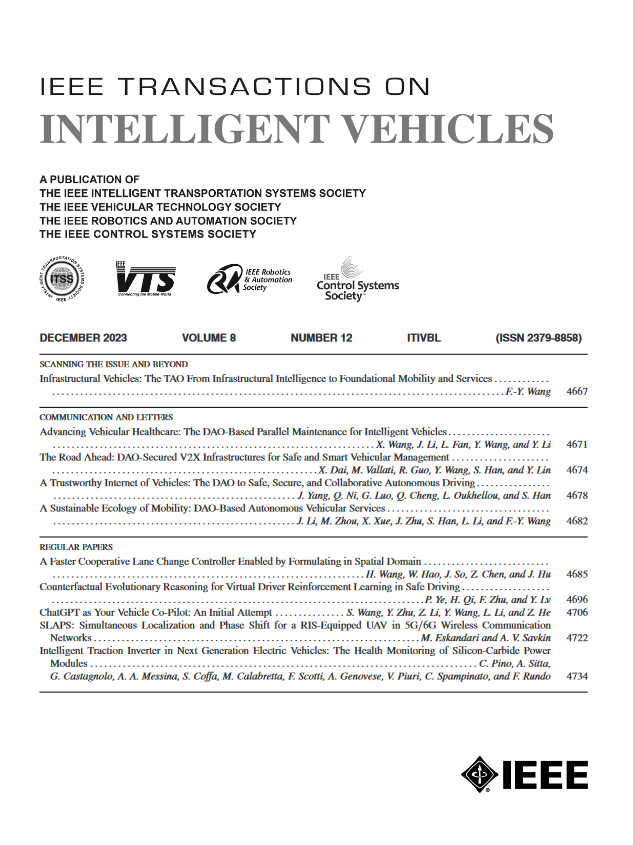Event-Triggered Parallel Control Using Deep Reinforcement Learning With Application to Comfortable Autonomous Driving
IF 14
1区 工程技术
Q1 COMPUTER SCIENCE, ARTIFICIAL INTELLIGENCE
引用次数: 0
Abstract
A novel event-triggered control (ETC) method, called deep event-triggered parallel control (deep-ETPC), is presented to achieve path tracking for comfortable autonomous driving (CAD) using parallel control and deep deterministic policy gradient (DDPG). Based on parallel control, the developed deep-ETPC method constructs a dynamic control policy by introducing variation rates of controls. By employing variation rates of controls, the developed deep-ETPC method is capable of indicating communication loss and comfortable driving indices in the reward, and then enables reinforcement learning (RL) agents to learn comfortable ETC driving policies directly. Moreover, the communication loss, which reflects ETC, is integrated into the reward, so there is no need to additionally design/train triggering conditions, which can be considered a type of multi-tasking learning. Furthermore, an ETPC-oriented DDPG algorithm is developed to achieve the developed deep-ETPC method, making DDPG applicable to ETC. Empirical results, including tracking a simple straight line trajectory and a complicated sinusoidal trajectory, demonstrate the effectiveness of the developed deep-ETPC method.使用深度强化学习的事件触发并行控制技术在舒适性自动驾驶中的应用
本文提出了一种名为深度事件触发并行控制(deep-ETPC)的新型事件触发控制(ETC)方法,利用并行控制和深度确定性策略梯度(DDPG)实现舒适自动驾驶(CAD)的路径跟踪。基于并行控制,所开发的深度-ETPC 方法通过引入控制的变化率来构建动态控制策略。通过使用控制的变化率,所开发的深度-ETPC 方法能够显示奖励中的通信损失和舒适驾驶指数,然后使强化学习(RL)代理能够直接学习舒适的 ETC 驾驶策略。此外,反映 ETC 的通信损失已被整合到奖励中,因此无需额外设计/训练触发条件,这可以被视为一种多任务学习。此外,还开发了一种面向 ETPC 的 DDPG 算法,以实现所开发的深度-ETPC 方法,从而使 DDPG 适用于 ETC。包括跟踪简单直线轨迹和复杂正弦轨迹在内的实证结果证明了所开发的深度-ETPC方法的有效性。
本文章由计算机程序翻译,如有差异,请以英文原文为准。
求助全文
约1分钟内获得全文
求助全文
来源期刊

IEEE Transactions on Intelligent Vehicles
Mathematics-Control and Optimization
CiteScore
12.10
自引率
13.40%
发文量
177
期刊介绍:
The IEEE Transactions on Intelligent Vehicles (T-IV) is a premier platform for publishing peer-reviewed articles that present innovative research concepts, application results, significant theoretical findings, and application case studies in the field of intelligent vehicles. With a particular emphasis on automated vehicles within roadway environments, T-IV aims to raise awareness of pressing research and application challenges.
Our focus is on providing critical information to the intelligent vehicle community, serving as a dissemination vehicle for IEEE ITS Society members and others interested in learning about the state-of-the-art developments and progress in research and applications related to intelligent vehicles. Join us in advancing knowledge and innovation in this dynamic field.
 求助内容:
求助内容: 应助结果提醒方式:
应助结果提醒方式:


